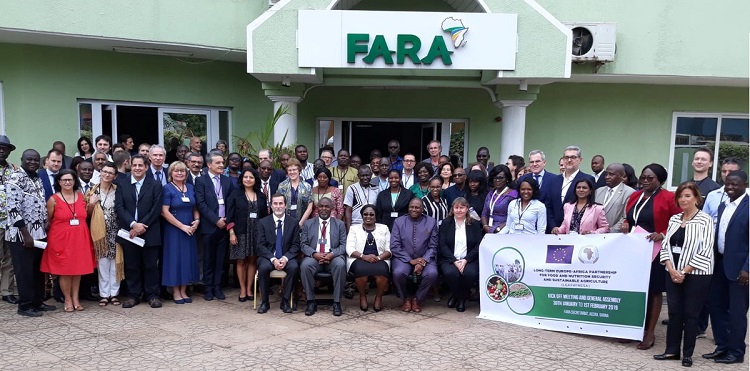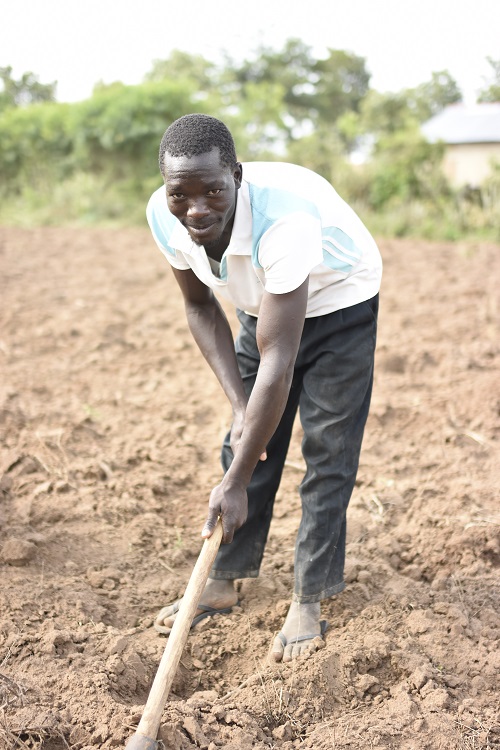‘End hunger, achieve food security and improved nutrition and promote sustainable agriculture’ reads Sustainable Development Goal number 2, succinctly abbreviated to ‘zero hunger’. A new initiative aims to address SDG2 through improving the coordination of policies, programmes and funding mechanisms aimed at enhancing food and nutrition security in a sustainable manner. To do this, 35 organisations from Europe and Africa are creating a platform to better coordinate research and innovation efforts. NRI’s Dr Tim Chancellor and Professor Adrienne Martin are helping to take forward this highly strategic initiative.
 “Ensuring that everyone has access to sufficient quantities of safe and nutritious food is one of the major challenges facing humanity. With a changing climate and increasing pressure on the planet’s natural resources, this will become even more difficult to achieve in the future, and we need to produce this food in a way that does not harm the environment,” says Dr Chancellor, who attended the initiative’s kick-off meeting in Ghana this January. The meeting was formally opened by Madam Patricia Apiagyei, the Hon. Deputy Minister of Environment, Science, Technology & Innovation of Ghana. The African Union Commission was represented by Dr Mawoko Philippe and the European Commission by Agnieszka Romanowicz. The meeting was hosted by the lead African partner, the Forum for Agricultural Research in Africa (FARA), whose Executive Director, Dr Yemi Akinbamijo, described this initiative as “an opportunity for Africa and Europe to come together around a common interest in Agricultural Research and Development (ARD) and reinvigorate our partnership,” during his welcome remarks.
“Ensuring that everyone has access to sufficient quantities of safe and nutritious food is one of the major challenges facing humanity. With a changing climate and increasing pressure on the planet’s natural resources, this will become even more difficult to achieve in the future, and we need to produce this food in a way that does not harm the environment,” says Dr Chancellor, who attended the initiative’s kick-off meeting in Ghana this January. The meeting was formally opened by Madam Patricia Apiagyei, the Hon. Deputy Minister of Environment, Science, Technology & Innovation of Ghana. The African Union Commission was represented by Dr Mawoko Philippe and the European Commission by Agnieszka Romanowicz. The meeting was hosted by the lead African partner, the Forum for Agricultural Research in Africa (FARA), whose Executive Director, Dr Yemi Akinbamijo, described this initiative as “an opportunity for Africa and Europe to come together around a common interest in Agricultural Research and Development (ARD) and reinvigorate our partnership,” during his welcome remarks.
“It is very encouraging that the African Union and the European Union have identified this issue as a key priority for joint action,” continues Dr Chancellor. “They recognise the important contribution that is being made by science and innovation to addressing hunger and malnutrition. At the same time, they realise that there is a need to better coordinate current research and innovation efforts to make more rapid progress. The creation of this new international research platform is a positive step in this direction.”
Entitled the ‘Long-Term Europe-Africa Partnership for Food and Nutrition Security and Sustainable Agriculture’ and known as LEAP4FNSSA, the initiative will provide direct support to the EU-Africa High-Level Policy Dialogue (HLPD) on Science, Technology and Innovation (STI). The HLPD serves as a platform for regular exchanges on research and innovation policy and aims to formulate and implement long-term priorities to strengthen Africa-Europe cooperation in the STI fields. Funded by the European Union, LEAP4FNSSA is coordinated by Philippe Petithuguenin of CIRAD, with partners including universities, research institutes, government ministries, and representatives of the private sector and civil society.
NRI’s main role in LEAP4FNSSA is to help to design and implement a robust process for tracking the progress of the joint efforts of the European Union and African Union towards achieving its objectives on food and nutrition security and sustainable agriculture. NRI’s contribution is being led by Prof Adrienne Martin, Social and Institutional Development Specialist, who brings expertise in Monitoring and Evaluation of developmental initiatives. The High-Level Policy Dialogue which this initiative supports, has designated food and nutrition security and sustainable agriculture as the top priority for joint research and innovation. By informing policy, and ultimately shaping research programmes and funding mechanisms, this initiative has the potential to improve lives and livelihoods in many African countries.
In his address at the launch meeting, Dr Akinbamijo keenly observed how FARA’s new Strategic and Business Plan is “built on the premise that the use of science will increase productivity and production but that at the same there is need of improving African agricultural institutions (policy, markets, financing institutions etc.) by strengthening the science-policy interface.” He continued, “To achieve this, the partnership built around science, technology and innovation is crucial. LEAP4FNSSA therefore comes at an opportune time.”
Links: Press releases by FARA & CIRAD | Dr Chancellor's profile | Professor Martin's profile
